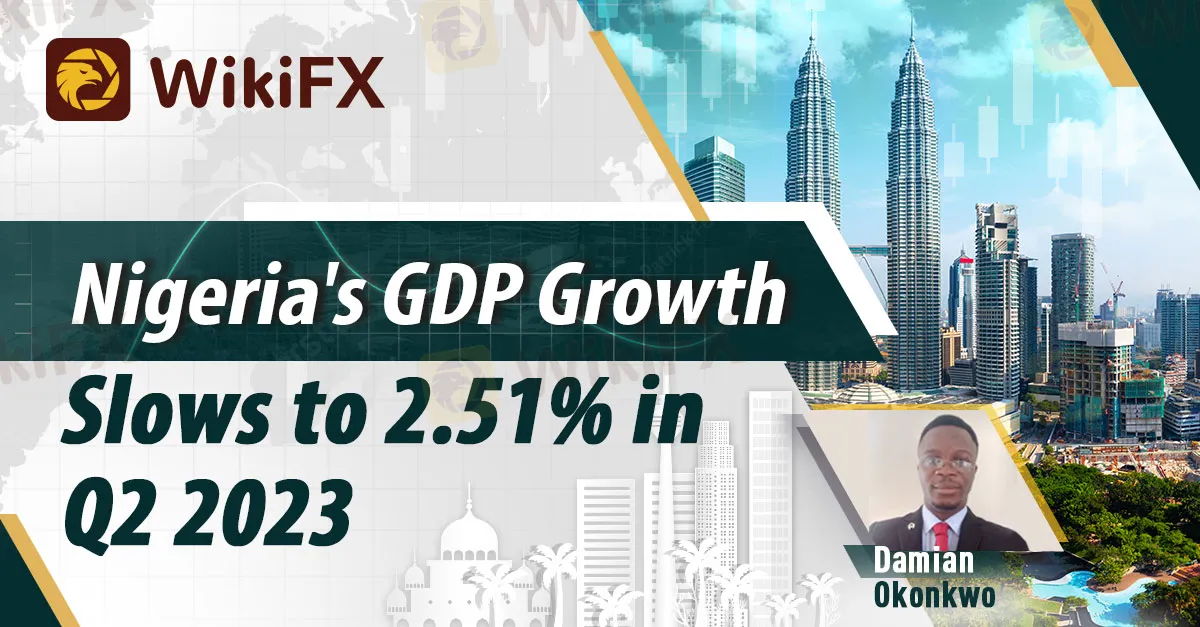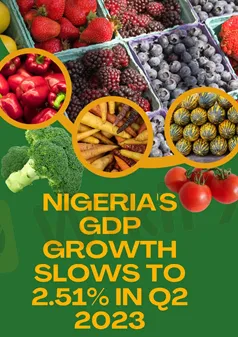简体中文
繁體中文
English
Pусский
日本語
ภาษาไทย
Tiếng Việt
Bahasa Indonesia
Español
हिन्दी
Filippiiniläinen
Français
Deutsch
Português
Türkçe
한국어
العربية
Nigeria's GDP Growth Slows to 2.51% in Q2 2023
Abstract:Nigeria's GDP slowed to 2.51% in the second quarter of 2023, down from 3.54% in the same quarter of 2022. This marked the lowest growth rate in Nigeria since the third quarter of 2020.

By: Damian Okonkwo

Abuja, Nigeria - Nigeria's gross domestic product (GDP) growth slowed to 2.51% in the second quarter of 2023, down from 3.54% in the same quarter of 2022, according to the National Bureau of Statistics (NBS).
This marked the lowest growth rate in Nigeria since the third quarter of 2020. The high level of decline witnessed in the country's GDP growth rate has been attributed to many factors, including:
● The removal of fuel subsidies in Nigeria in June, which has increased the cost of living for households.
● A weak currency, which has made it more expensive to import goods and services.
● A high level of debt, which is putting a strain on the government's finances.
● A lack of investment, which is hindering economic growth.
● A poor infrastructure, which is making it difficult to do business in Nigeria.
● The ongoing war in Ukraine, which has disrupted global supply chains and caused commodity prices to rise.
In addition to these factors, the Nigerian economy is also facing many other challenges, including:
● Security crisis, which is disrupting economic activity in some parts of the country.
● An increasing population with scarce resources.
● Climate change, which is causing more extreme weather events and making it more difficult to produce food.
The government has taken some steps to address the economic slowdown, including raising interest rates and devaluing the naira. However, these measures seem to have put more pressure on the economy, with more businesses folding up due to the high cost of borrowing.
Analysts are divided on the outlook for the Nigerian economy in the coming months. Some believe that the economy will continue to slow, while others believe that it will start to recover in the second half of the year.
The current economic slowdown has increased the hardship in the country, and the government is expected to take more urgent action to address the challenges facing the country.
The government can consider many measures to stimulate economic growth, including:
● Investing in infrastructure, such as roads, railways, and power plants.
● Promoting exports and attracting foreign investment.
● Reforming the education and healthcare systems.
● Working to improve the security situation in Nigeria.
The government also needs to work with the private sector to develop a plan for economic growth. The private sector is the engine of growth in any economy, and the government needs to create an environment where businesses can thrive.
Conclusion
The Nigerian economy is facing many challenges, but there are also growth opportunities. If the government takes the right steps, the economy could start to recover in the second half of the year. However, the situation could get worse if the government fails to take urgent measures to redeem the present economic distress in the region.

Disclaimer:
The views in this article only represent the author's personal views, and do not constitute investment advice on this platform. This platform does not guarantee the accuracy, completeness and timeliness of the information in the article, and will not be liable for any loss caused by the use of or reliance on the information in the article.
Read more

Forex Trading: Scam or Real Opportunity?
Meta: Explore forex trading: Is it a scam or real opportunity? Learn how it works, debunk myths, manage risks, and avoid scams with tools like WikiFX App. Start trading safely today!

T&D vs AvaTrade: Which Broker Suits Your Trading Needs in 2025?
In this article, we compare these brokers based on basic information, regulatory status, leverage, trading platforms, account types, spreads and commissions, customer service, AI tools, and recent updates. Our goal is to provide an objective overview so you can decide which broker aligns better with your trading style and requirements.

5 Arrested in the TriumphFX Investment Scam Investigation
Malaysian authorities have intensified their investigation into the TriumphFX foreign exchange investment scam, resulting in the arrest of five individuals linked to the fraudulent scheme.

Notice: The WikiFX Simulated Trade Weekly Competition has been suspended for one week
Due to an upcoming product upgrade to enhance your overall trading simulation experience, the WikiFX Simulated Trading Weekly Contest will be temporarily suspended from March 10 to March 16. The contest will resume on March 17 with a host of improvements.
WikiFX Broker
Latest News
Is $CORONA Memecoin a Legit Crypto Investment?
Is Pi Network the Next Big Crypto Opportunity?
Is Linkbex a Scam? SFC Warns of Virtual Asset Fraud in Hong Kong
Donald Trump’s Pro-Crypto Push Boosts PH Markets
5 Best Copy Trading Brokers: You Can Trust in 2025
3 EXCLUSIVE Ramadan Offers That Won’t Last Long! ACT NOW
The Next Crypto Giants: 5 Altcoins to Watch
Japan’s Shift in Crypto Policy and What It Means for Investors
Forex Trading: Scam or Real Opportunity?
The Hidden Tactics Brokers Use to Block Your Withdrawals
Currency Calculator






